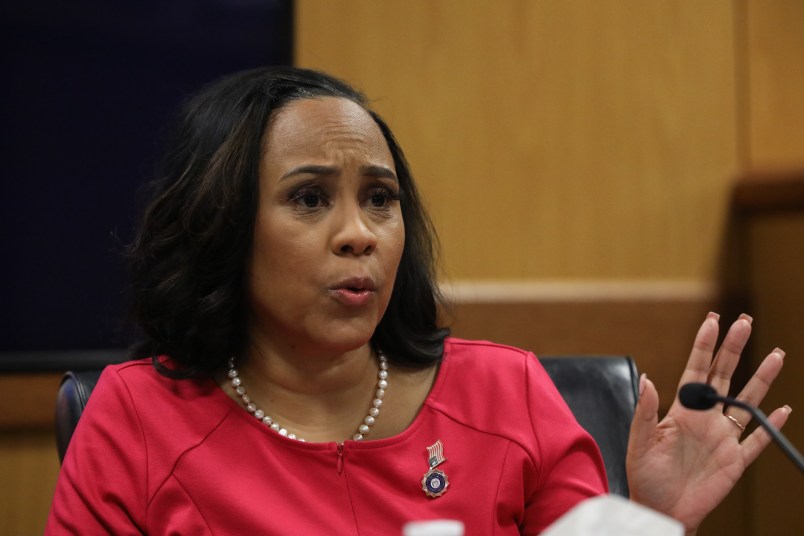Fulton County District Attorney Fani Willis can stay on the Trump RICO case if the prosecutor with whom she had a relationship removes himself from it, the judge in the case ordered on Friday.
Superior Court Judge Scott McAfee declined to do what Donald Trump and his allies wanted: find that Willis received a “material financial benefit” in the case from her relationship with attorney Nathan Wade, who she hired as a prosecutor.
Instead, McAfee split the baby: Willis can stay on if Wade withdraws. If he doesn’t, then she must remove herself from the RICO prosecution. In doing so, he’s delivered a stinging personal and professional rebuke to Willis. He deplored her conduct on the witness stand, criticized her professional judgment, and questioned her ethical compass. He was even harder on Nathan Wade, the attorney who Willis brought on to prosecute the case and with whom she took lavish vacations while in a romantic relationship.
“An odor of mendacity remains,” the judge said.
Instead of finding an actual conflict of interest, McAfee identified a “significant appearance of impropriety that infects the current structure of the prosecution team.”
McAfee, by the ruling, is essentially forcing an outcome: Wade’s withdrawal from the case. He was scathing about Willis’ conduct throughout the ruling, saying that she had repeatedly shown poor judgment and that her and Wade’s testimony cast an “odor” of untruthfulness. But he declined to order Willis removed from the case.
Willis’s defense against the charge that she was benefitting financially from the Trump RICO case via her relationship with Wade rested on her timeline: she asserted that the two only began dating after Wade was hired in 2021, potentially deflating the claim that Willis hired him in a bid to reap financial benefits from his payment for the case.
But that defense took a severe shellacking during a grueling two and a half day evidentiary hearing. One witness, a former friend of Willis’s, outright contradicted her, while another, attorney Terrence Bradley, fell apart on the stand in spite of texts that emerged showing that he had told attorneys for Trump’s associates that he believed the relationship began long before Wade’s hiring.
During that hearing, Willis delivered fiery testimony in which she attributed her decision to reimburse Wade for travel expenses in cash to her upbringing in the black community. It had a lot of resonance publicly, but failed to work on McAfee.
In the ruling, he described Willis’ testimony as “unprofessional,” and said that she had demonstrated a “tremendous lapse in judgment.”
“Georgia law does not permit the finding of an actual conflict for simply making bad choices – even repeatedly,” McAfee wrote.
And though he declined to disqualify Willis, McAfee made a conspicuous point: that there are other bodies which could “offer feedback on any unanswered questions that may linger,” including Fulton County voters, the county board of commissioners, the Georgia State Bar, and the state ethics commission.
During closing arguments, each side prodded McAfee to adopt a different standard of evidence. On the defense, attorneys for Trump and his allies wanted McAfee to rule based on the appearance of a conflict of interest; prosecutors wanted McAfee to issue a ruling based on an actual conflict of interest. The resulting ruling found that while there was not enough evidence to establish an actual conflict, there were more than enough holes poked in Willis’ and Wade’s testimony to leave an “odor of mendacity.”
“An outsider could reasonably think that the District Attorney is not exercising her independent professional judgment totally free of any compromising influences,” McAfee wrote. “As long as Wade remains on the case, this unnecessary perception will persist.”
The judge also singled Wade out over his apparent lack of candor throughout. Defense attorneys grilled Wade over interrogatories he provided in the course of his divorce proceedings, saying that they clearly conflicted with what he was telling the court about his relationship with Willis.
McAfee found Wade’s testimony generally and specifically in response to the divorce questions unreliable, saying that his explanation for the interrogatories was “patently unpersuasive” while suggesting that it showed a willingness to “wrongly conceal his relationship with the District Attorney.”
McAfee rejected a separate claim from the Trump defendants asking him to dismiss the RICO indictment over allegedly improper comments which Willis made about the case during a January speech at a church and to journalist Mike Isikoff.
The judge was similarly scathing about Willis’ judgment in making the remarks, but declined to dismiss the indictment based on her remarks. McAfee suggested that he would be open to an order barring Willis from “mentioning the case in any public forum,” but said that no such motion was up for his consideration.
Read the ruling here:







Do it, and move on. End this sideshow today,
Great! Now can we move forward with a conviction!!!
I can live with this decision. Now try the bastards and convict them!
Wade should resign. If he cares at all for Fani, he will.
Easiest choice ever.
